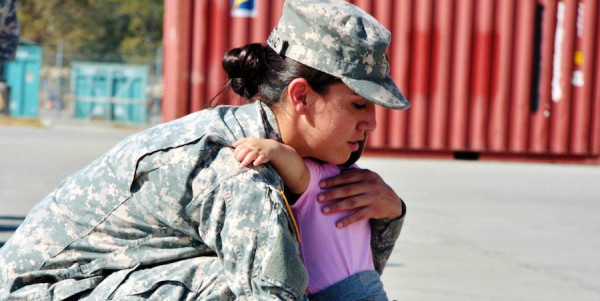

I left my job in 2011 to care full time for my 3-year-old daughter and 10-month-old son. My days are now filled with crafts at the kitchen table, soggy diapers, Disney movies and playdates. I am so incredibly lucky to be able to spend this time with my kids everyday, but have discovered an unexpected challenge that I am still coming to terms with: connecting with other parents.
We recently went to the public library to participate in storytime. My daughter was excited to let loose and do the Hokey Pokey and I looked forward to meeting other parents. Yet conversations tend to go like this:
Mom: Oh, I see you have an Operation Iraqi Freedom veteran license plate. Did your husband serve?
Me: Yes he did! Thank you. We are so proud of him.
But the license plate is mine because I served too. I don’t share this with this other mom because it’s far simpler for her to think of me as a nice blonde lady with the two kids and a hero for a husband.
However, I am a former Army captain. I was a field artillery officer who deployed for 18 months in support of combat operations in Iraq. When I do tell other moms this, I often get response like, “Oh yeah, my grandpa was in the Army. Or maybe the Air Force?”
So I have learned to quiet that part of me. I have learned to talk only of the children. What sign language words my son is using. What activity I have registered my daughter up for. Potty-training woes. Sleep-deprivation woes. Organic fruits and veggies. Vaccinations. I am now comfortable hiding my past, and even if it is brought up, not talking about it too much.
I think many veterans share this experience, finding it hard to connect with our civilian counterparts either at work or when interacting with other parents.
It’s not that I am unfamiliar with being an outcast. Any woman in the military will tell you at one point in time or maybe her entire career, she felt like an outsider. It’s part of the job; one extra mountain to climb.
I expected to face it as a military officer; my male counterparts doubting me until I was able to prove myself. My soldiers waiting for me to fail. I overcame those stigmas; clenched my jaw, took one step after another with my 30-pound ruck, boots cutting my feet open.
But, I never expected similar obstacles at a gathering of like-minded women; women who have put aside their careers and other personal goals to do the noblest job of all: raise the next generation. Just like me.
The difference is that in my military experience, those stigmas were easily washed away the minute I showed my doubters and naysayers that I was strong, driven, and competent. I found a way to be accepted and it was through hard work, determination, and demonstrating how as a woman, I was able to improve mission effectiveness. Once in Iraq, my escort team and I met with local farmers to discuss plans to rehabilitate livestock. Being the only woman in the group, I was allowed to meet one farmer’s three wives. They were literally padlocked in a room with a little television. I was scared and never felt so tall, or white, or blonde in my entire life. I wasn’t afraid of dying; it was something else: fear of the unknown. Realizing how I must looked with all my battle rattle, I pulled off my kevlar and laid my M16 by the door. I was making a gesture of peace and trust.
They wanted to take pictures with me. They were 20-year-old women, like me. We connected.
So sometimes when civilian mothers want to talk about pureeing vegetables and sneaking it into recipes in a desperate attempt to get their child to consume something healthy, I laugh at how simple my world is now. I think about how far I’ve come to end up here, in this stale-smelling library casually chatting. Maybe they sense me drifting mentally.
But even if I can’t connect with these trophy wives, I can clench my jaw, I can go to the next park playdate, I can carry a 30-pound diaper bag, front carrier cutting into my shoulders. And someday I will explain to my daughter, that she can be an Army Ranger and a mom. They’re really very similar fields.
